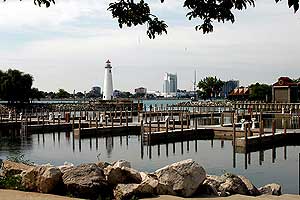
The Michigan Department of Natural Resources is finalizing details with the city of Detroit on a lease that will enable
Tricentennial State Park and Harbor to expand from its current nine acres to more than 31. Once land control is assured, DNR will begin work on the seven-acre Lowland Park Parcel, a piece of land immediately east of the Detroit Riverfront Conservancy's Rivard Plaza.
The Lowland Park Parcel will be returned to wetlands that will be used to demonstrate stormwater runoff treatment. Vicki Anthes, planning section chief of the DNR's parks and recreation division explains, "We want to show how you can treat runoff without sending it to a treatment plant." Beyond the interpretive elements associated with the wetland, Lowland Park will include bike and pedestrian paths that will connect to the DRC's RiverWalk.
The remainder of Tricentennial's acreage is reserved for usage to be determined after a series of public meetings are held later this year. Anthes explains that the DNR wants to learn "What kinds of things the public wants that are compatible with our mission," noting that the activities might be both "educational and recreational."
Anthes also notes that the part of Tricentennial Park north of Atwater Street will include a connection to the
Dequindre Cut. "This will be one of the important connections for our visitors to the park."
Ron Olson, chief of DNR's parks and recreation division says that, to Tricentennial Park, the agency hopes "to bring elements of State Parks and Recreation Areas across the state. We want to take elements of those features and encase them within this park even though it is small."
He goes on to say that, "This is also an entry point get urban folks interested in the out-of-doors, as gateway to go to other parks in the state. It is also a key piece of the riverfront revitalization."
The park's uniqueness helped the DNR secure funding for it. Contributors have included Michigan Economic Development Corporation,
Community Foundation for Southeast Michigan's Greenways Initiative, Department of Environmental Quality, Michigan Department of Transportation and the Michigan Natural Resources Trust Fund. Olson says that enough funds have been raised to pay for the construction of Lowland Park, but that the agency would need to raise additional funds for the remaining undeveloped part of the park.
The existing park and harbor will remain open. The 52-slip marina is primarily transient but, beginning this season, eight slips will become available as seasonal rentals. Tricentennial Park does not and will never require a vehicle permit for entry as do other State Parks.
Sources: Vicki Anthes and Ron Olson, DNR
Writer: Kelli B. Kavanaugh
Enjoy this story?
Sign up for free solutions-based reporting in your inbox each week.